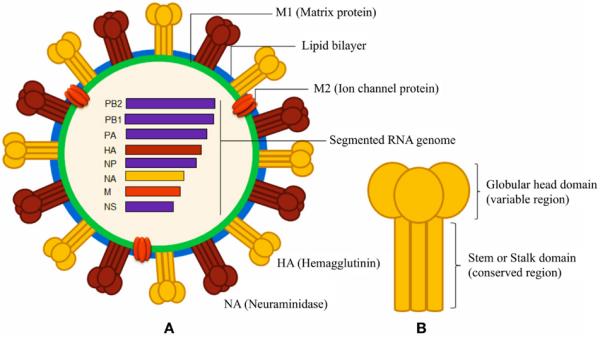 A universal influenza vaccine that will elicit immunity to all strains of influenza is the ‘Holy Grail’ of vaccine research. Current vaccines incorporate the “head” of a hemagglutination (HA) surface component of the virus. The unique HA protein is recognised by the immune system of the host stimulating an antigenic resonse. Due to variation in the composition of the “head”, vaccines must be constantly reconfigured to provide protection against emerging strains. In contrast, the sequence of amino acids in the “stalk” of the HA surface protein is conserved. Attempts to develop vaccines based on stalk protein have to date been unsuccessful due to the instability of HA stalk suspensions.
A universal influenza vaccine that will elicit immunity to all strains of influenza is the ‘Holy Grail’ of vaccine research. Current vaccines incorporate the “head” of a hemagglutination (HA) surface component of the virus. The unique HA protein is recognised by the immune system of the host stimulating an antigenic resonse. Due to variation in the composition of the “head”, vaccines must be constantly reconfigured to provide protection against emerging strains. In contrast, the sequence of amino acids in the “stalk” of the HA surface protein is conserved. Attempts to develop vaccines based on stalk protein have to date been unsuccessful due to the instability of HA stalk suspensions.
Scientists at the Icahn School of Medicine at Mt. Sinai University, funded by the U.S. National Institute of Allergy and Infectious Diseases, developed chimeric HA preparations with the conserved stalk and a modified head that is not inactivated by circulating antibody as a result of previous exposure to arange of influenza viruses.
The stalk vaccine was evaluated in a Phase I study to confirm safety and to determine the extent of the immune response. Antibodies produced by human subjects protected mice infected with the corresponding strain of influenza virus.
Development of a universal influenza vaccine based on HA stalk antigen will not be the subject of a “warp speed” project, but will take at least two years to encompass a wide variety of influenza groups A and B. Following development of a candidate vaccine based on stalk HA surface antigen, a Phase II trial will determine efficacy and safety in comparison with conventional HA vaccines.
Application of new vaccine technology in humans could, if successful, provide more effective vaccines against avian influenza since the principles of infection are common across mammalian and avian species.
Nachbagauer, R. et al. A Chimeric Hemagglutinin-Based Universal Influenza Virus Vaccine Approach Induces Broad and Long-Lasting Immunity in a Randomized, Placebo-Controlled Phase I Trial. Nature Medicine (2020) doiorg/10:1038/s41591-020-118-7.
Seasonal flu vaccines induce antibodies against the “head” (slate) of the influenza surface protein hemagglutinin, but a new universal vaccine triggers antibodies (fragments of them shown in gray) that bind to the stalk (light blue) portion. JULIANNA HAN/WARD LAB/SCRIPPS RESEARCH